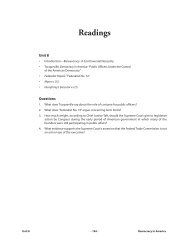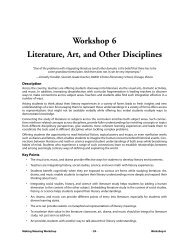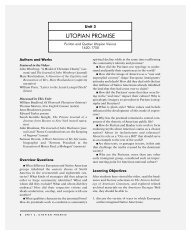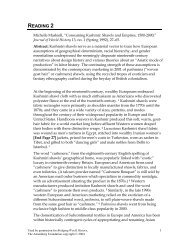Ethics Reader
Ethics Reader
Ethics Reader
You also want an ePaper? Increase the reach of your titles
YUMPU automatically turns print PDFs into web optimized ePapers that Google loves.
Plato<br />
From Apology (c. 360 B.C.)<br />
How you have felt, O men of Athens, at hearing the speeches of my accusers, I cannot tell;<br />
but I know that their persuasive words almost made me forget who I was—such was the<br />
effect of them; and yet they have hardly spoken a word of truth. But many as their<br />
falsehoods were, there was one of them which quite amazed me;—I mean when they told<br />
you to be upon your guard, and not to let yourselves be deceived by the force of my<br />
eloquence. They ought to have been ashamed of saying this, because they were sure to be<br />
detected as soon as I opened my lips and displayed my deficiency; they certainly did appear<br />
to be most shameless in saying this, unless by the force of eloquence they mean the force of<br />
truth; for then I do indeed admit that I am eloquent. But in how different a way from theirs!<br />
Well, as I was saying, they have hardly uttered a word, or not more than a word, of truth; but<br />
you shall hear from me the whole truth: not, however, delivered after their manner, in a set<br />
oration duly ornamented with words and phrases. No indeed! but I shall use the words and<br />
arguments which occur to me at the moment; for I am certain that this is right, and that at<br />
my time of life I ought not to be appearing before you, O men of Athens, in the character of<br />
a juvenile orator—let no one expect this of me . . . I am more than seventy years of age, and<br />
this is the first time that I have ever appeared in a court of law, and I am quite a stranger to<br />
the ways of the place; and therefore I would have you regard me as if I were really a stranger,<br />
whom you would excuse if he spoke in his native tongue, and after the fashion of his<br />
country;—that I think is not an unfair request. Never mind the manner, which may or may<br />
not be good; but think only of the justice of my cause, and give heed to that: let the judge<br />
decide justly and the speaker speak truly. . . .<br />
What do the slanderers say? They shall be my prosecutors, and I will sum up their words in<br />
an affidavit. "Socrates is an evil-doer, and a curious person, who searches into things under<br />
the earth and in heaven, and he makes the worse appear the better cause; and he teaches the<br />
aforesaid doctrines to others." That is the nature of the accusation . . . As little foundation is<br />
there for the report that I am a teacher, and take money; that is no more true than the other.<br />
Although, if a man is able to teach, I honor him for being paid. There is Gorgias of<br />
Leontium, and Prodicus of Ceos, and Hippias of Elis, who go the round of the cities, and<br />
are able to persuade the young men to leave their own citizens, by whom they might be<br />
taught for nothing, and come to them, whom they not only pay, but are thankful if they may<br />
be allowed to pay them. . . .<br />
Someone will say: And are you not ashamed, Socrates, of a course of life which is likely to<br />
bring you to an untimely end? To him I may fairly answer: There you are mistaken: a man<br />
who is good for anything ought not to calculate the chance of living or dying; he ought only<br />
to consider whether in doing anything he is doing right or wrong—acting the part of a good<br />
man or of a bad. Whereas, according to your view, the heroes who fell at Troy were not<br />
good for much, and the son of Thetis above all, who altogether despised danger in<br />
comparison with disgrace; . . . For wherever a man's place is, whether the place which he has<br />
chosen or that in which he has been placed by a commander, there he ought to remain in the<br />
Page 5
















